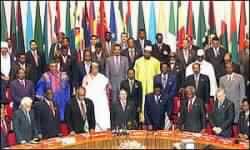HIGHLIGHTS: AU to Emphasize Improved Governance & Economic Growth|| Obasanjo Briefs Leaders on New Partnership for Africa's Development (NEPAD)||Leaders Talk About Differences & How They Want the AU to Evolve||Draft Agenda Excludes Zimbabwe||Annan in Durban for AU Launch||OAU's Decision on Madagascar to be Reviewed|| STORY: African leaders held informal talks Sunday to thrash out differences ahead of the launch of the African Union, which will emphasize improved governance and economic growth, diplomats said. (Read photo caption)
Some 20 heads of state had arrived in South Africa by early afternoon for the summit starting Monday to bury the Organization of African Unity (OAU) and launch its successor, the African Union (AU), witnesses said.
Libyan leader Muammar Gaddafi, who arrived in Durban on Saturday, met some of his colleagues for private talks on a new pro-investment plan for the world's poorest continent.
Nigerian President Olusegun Obasanjo briefed the leaders on the New Partnership for Africa's Development (NEPAD), a recovery blueprint which offers better governance as a magnet to attract foreign capital and boost aid from wealthy states.
Gaddafi, who swept into the talks surrounded by a large entourage of Libyan bodyguards and officials, has criticized the NEPAD project as too capitalist and pro-Western.
Kenya, Uganda and Tanzania have also complained that they were not represented on NEPAD's core steering committee.
"The leaders talked about their differences and how they want the African Union to evolve," said a Zambian diplomat.
Asked whether he thought NEPAD was dominated by South Africa, the continent's economic powerhouse, Gaddafi told Reuters at the beach hotel where the meeting was being held: "Never mind, it is okay."
Gaddafi has said NEPAD will make Africa even more dependent on the West than it already is.
U.N. Secretary-General Kofi Annan arrived Sunday and was holding talks with senior officials from U.N. agencies.
African ministers meeting late Saturday agreed a draft agenda that excluded Zimbabwe -- where a deepening economic and political crisis is being cited as a test for Africa's commitment to improve governance and promote human rights.
MBEKI, OBASANJO TO MEET ZIMBABWE'S MUGABE
But host South African President Thabo Mbeki and Nigeria's Obasanjo -- asked by the Commonwealth to mediate in the Zimbabwe political crisis -- were due to hold private talks with Zimbabwean leader Robert Mugabe on his country's problems.
African ministers also agreed to let heads of state review the OAU's decision not to recognize Madagascar's President Marc Ravalomanana "because of a change in the situation on the ground," a senior African diplomat told Reuters.
The change the diplomat spoke of was the flight from Madagascar of former president Didier Ratsiraka.
The ministers will recommend to heads of state the creation of a permanent election monitoring commission to be based at the secretariat of the African Union, to replace ad-hoc monitors it has used in previous African elections.
The summit is expected to attract more than 40 heads of state and government. It is the first time South Africa has hosted the pan-African summit since apartheid was formally ended with landmark all-race elections in 1994.
Tight security was enforced in Durban where the government was using the summit as a security dress rehearsal for a global environment summit that will bring some 100 heads of state to Johannesburg from late August, African diplomats said.
PHOTO CAPTION
African foreign ministers say they have agreed on a powerful new security council aimed at stemming human rights abuses, conflicts or halting genocide. Diplomats said on Wednesday that the Peace and Security Council would comprise 15 African countries and have powers to deal with conflict and security issues under the new African Union (AU). AU will replace the 40-year-old Organisation of African Unity (OAU) next Tuesday.
- Author:
& News Agencies - Section:
WORLD HEADLINES


 Home
Home Discover Islam
Discover Islam Quran Recitations
Quran Recitations Lectures
Lectures
 Fatwa
Fatwa Articles
Articles Fiqh
Fiqh E-Books
E-Books Boys & Girls
Boys & Girls  Articles
Articles










